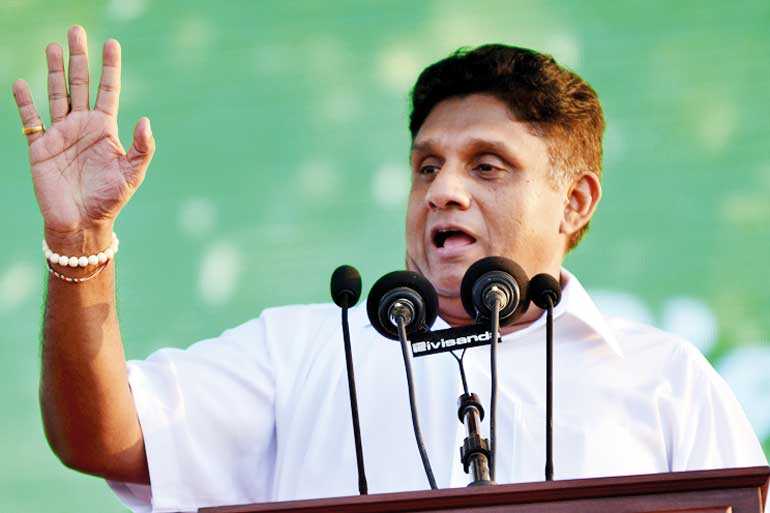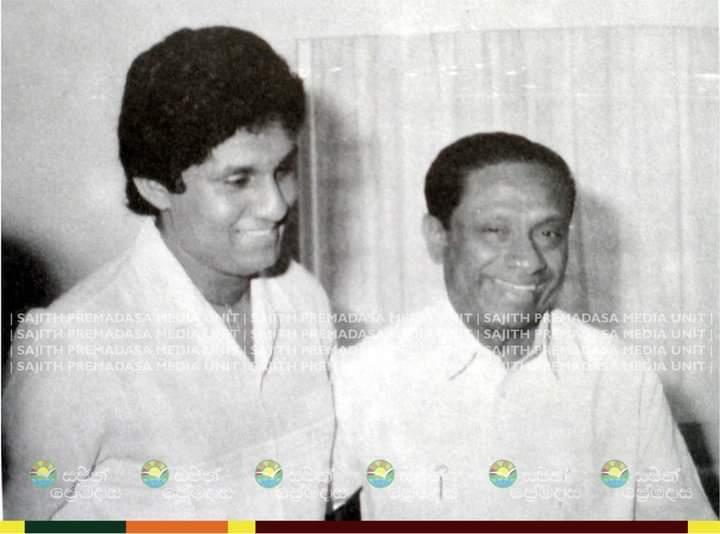
Does Sajith Premadasa have the 'will to overcome' his father had?
(MENAFN- NewsIn.Asia) By Dayan Jayatilleka/The Sunday Leader
In 1988, in the throes of an existential crisis and out of sheer need for electoral and socio-political survival, the United National Party (UNP) reluctantly handed over the leadership to Ranasinghe Premadasa, who dubbed it 'a torch blazing at both ends.'
Will the UNP be ready today, and for the same reason, to hand over the reins to his son?
In that year, when Mr. Premadasa was unsure that he would get UNP nomination, he was fully prepared to leave the party and contest as the head of a new formation, between the discredited elitist UNP and the Bandaranaikes' SLFP.
Is Sajith prepared to do the same?
Those (including perhaps Sajith himself) who think my question is premature and a bit over the top, should consider this: what prevents the ruling coalition from unveiling a new 'first past the post' electoral system and going for a mid-term parliamentary election? Judging by current trends and data of a decade, the UNP, if it remains under Ranil Wickremesinghe, would be overrun and crushed to a pulp, not even reaching double digits in terms of seats.
Follow-up question: How can a UNP which is unable to ditch an ineffectual and effete Ranil Wickremesinghe, convince the majority of voters that it can dislodge an infinitely more popular and stronger customer, Mahinda Rajapaksa or what it decries as 'Rajapaksa rule' and the 'Rajapaksa dynasty'?
The view that the UNP in opposition cannot afford an inner party struggle and that such debate would debilitate it further appears true at first glance, but flies in the face of the UNP's own history as well as the record of the recovery of mainstream democratic parties the world over, from prolonged stints in opposition.
The titanic victory of the UNP in 1977 and the near miracle of its retention of power after a traumatic decade, through reinventing and rebranding with the Premadasa presidential candidacy, were only possible and were the result of bitter yet clarificatory inner-party struggles which convulsed the party in 1970-5.
The UNP that was so wracked by inner party struggle was not, on the face of it, a party that could have afforded it. It was a party that was down to a mere handful of seats, for the second time since 1956. This didn't prevent an earlier generation of UNP personalities from engaging in a sharp struggle within the party. However in comparison to today's UNP politicians, those men were giants.
The struggle within the UNP featured three, not just two groupings: a pro J.R. Jayewardene tendency which turned out to be dominant, a Senayakae-ist tendency headed by Rukman and supported by J.R.P. Suriyapperuma, Jinadasa Niyathapala and Ossie Abeygoonesekara and Mr. Premadasa heading the Puravesi Peramuna supported by Sirisena Cooray, Gamini Fonseka and Rev. Meetiyagoda Gunarathana Thero.
It is the open clash of ideas between these factions that resulted in the winning policy synthesis that went into the manifesto of 1977 and the second victorious manifesto, that of candidate Premadasa in 1989.
As important, it resulted in the change in party leadership from the Senanayakes to J.R. Jayewardene and more correctly the superb JR-Premadasa combination, and the radical transformation of the UNP into a truly national mass party, almost a mass opposition movement, without which the overturning of the powerful United Front coalition government would have been impossible.
The bald fact is that in order to beat back the threat of globalized and offshore based Tamil separatism, as well as to capitalize on peace and plug into the Asian economic miracle, Sri Lanka will have to reverse some of the policies of discrimination and leveling down, that successive SLFP administrations adopted, especially in the fields of public administration and education/higher education.

Sajith Premadasa
This means that while Sri Lanka's present is best served by a Rajapaksa administration, Sri Lanka's future prospects are best served by a certain type or brand of UNP leadership. I emphasize 'a certain type' for two reasons. Firstly and most plainly, Ranil Wickremesinghe or a Ranil clone cannot get a UNP government elected. Secondly, the UNP needs a leader who would balance off the necessary modernizing reforms with those that immediately ensure greater equity in the distribution of the fruits of that growth (what President Premadasa called, 'not trickle-down but cascading down').
As Ranil Wickremesinghe demonstrated during his two years as prime minister, he is manifestly not such a leader.
True, he was evicted by President Kumaratunga, but she followed it up with an election and Ranil was soundly defeated by an SLFP-JVP coalition created by the social backlash to his security policies in the north-east and socio-economic policies in the south. (Respected researchers Sunil Bastian and Mutukrishna Sarvananthan wrote devastating critiques of the economics of the CFA phase; critiques confirmed by the study headed by Jonathan Goodhand of SOAS).
Does the UNP have a personality who can fit the bill? Someone who is educated enough to lead the country into an Asia that is led by an educated elite; has sufficient experience of the West to understand it and mend fences but trusted by Sri Lankans never to sell out the nation? Is there someone who is solidly Sinhala Buddhist but not narrowly chauvinist or communal minded and can therefore win the minorities without repelling the majority as Ranil does? Is there someone who is so knowledgeable in economics that he can plan and pilot our sustainable take-off, while simultaneously alleviating poverty and thereby pre-empting a social backlash?
The answer is obvious and it is yes, there is. Sajith Premadasa, educated at a British public school and the LSE (specializing in economics), is certainly far better educated that Ranil Wickremesinghe or any of his supporters. He is almost certainly far more popular, both among the party members and voters and in the country. He has at least two drawbacks though. He lacks his father's self-propelled drive and autonomy.
As a teenager, Ranasinghe Premadasa organised the Sucharitha movement and as a junior politician he took on Dr. N.M. Perera in Ruwanwella at the 1956 elections (with the UNP on the way out) and lost by only a few thousand votes. As a politician in defeat he formed the Puravesi Peramuna and publicly demanded change in the party. He never awaited conferment of responsibility from the leadership but created space for himself, 'seizing the time'. He liked the title of Jerry Rubin's autobiography because it matched his innermost slogan: 'DO IT!'
So, Sajith Premadasa can do it, but will Sajith Premadasa DO IT?
Sajith must also know that he cannot do it alone. At all stages, Ranasinghe Premadasa had a core of loyalists and lieutenants with him, and that was because he had given them enough reason to believe in him, and his drive to get to the top. He always gave the lead, took the initiative.
Dayasiri Jayasekara may make a good deputy for Sajith.
Mahinda Rajapaksa won the war when others could not, because of sheer political will. Does Sajith have the drive to save his party and his country, which can match Ranil Wickremesinghe's tenacity to stay on as leader of his party? Does his motivation match and overcome that of Ranil?
His father, Ranasinghe Premadasa, was the epitome of the Nietzschean 'will to power', more accurately translated from the German as 'the will to overcome' — though it was never fully deployed and thereby failed in relation to the Tigers.
Does Sajith have the requisite 'will to overcome'? For the sake of Sri Lanka let us hope that he has, or will generate it rapidly enough.
(The featured image at the top shows Sajith Premadasa with his father and former Lankan President Ranasinghe Premadasa)

Legal Disclaimer:
MENAFN provides the
information “as is” without warranty of any kind. We do not accept
any responsibility or liability for the accuracy, content, images,
videos, licenses, completeness, legality, or reliability of the information
contained in this article. If you have any complaints or copyright
issues related to this article, kindly contact the provider above.


















Comments
No comment